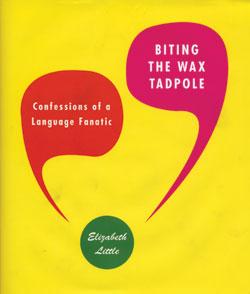You may be familiar with the rumor that when “Coca-Cola” is translated into Chinese it means “bite the wax tadpole.” While that’s not entirely true, that is where the title of author Elizabeth Little’s debut book on language comes from. The story goes that Chinese shopkeepers had a hard time finding a phonetic equivalent for Coca-Cola when the company began marketing the product in the country, and one commonly used written solution translated literally as “bite the wax tadpole.”
“Biting the Wax Tadpole” is fascinating and funny. It will have language aficionados enthralled with its exploration of the various rules and irregularities of spoken and written languages of the world. Yet, the average reader will still find the book’s anecdotes, complete with illustrations, amusing.
Little as an author is charming, witty and instantly likable. This book will pleasantly surprise anyone that thought language was boring. Little clearly enjoys language and its subtle nuances, and it shows. She also very clearly knows her stuff, and is quick to show her authority on a range of subjects. Whether it is definite and indefinite articles, verb conjugation or noun declension, she is on top of it all. The book covers languages from all over the world, and Little is equally knowledgeable about Romance languages (such as Italian, French and Spanish), as she is Slavic, Native American, and Asian. The book is filled with examples of peculiarities of major languages as well as minor ones. She even covers constructed languages (e.g. Esperanto), dead languages (e.g. Latin), and near-dead languages (e.g. Sanskrit).
While you don’t need to be a language nerd to understand the anecdotes and tales from Little’s various life experiences, the book can get a bit technical. If you’re not an English major or a master of linguistics, you may find some of the book to be confusing and hard to follow. Verb tense may seem like an easy enough concept, but just wait until you reach the section about noun case in Icelandic and Hungarian’s eighteen cases of noun declension. If you don’t know what dative-genitive, essive-formal or essive-modal noun cases are, you may as well skip that section completely. Unfortunately, Little doesn’t do much to clarify such complex concepts, and the reader is better off just going along for the ride, and waiting for the inevitable punch-line.
Still, there is a lot to be learned in this book. For example, what language is the only language that has no verbs? And why does the Icelandic government have a Naming Committee that must approve any nontraditional baby name? You’ll have to read the book to find out.





















































